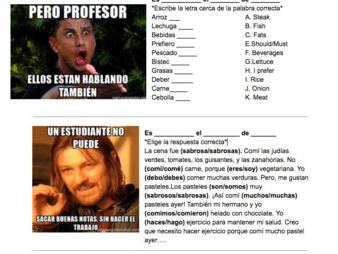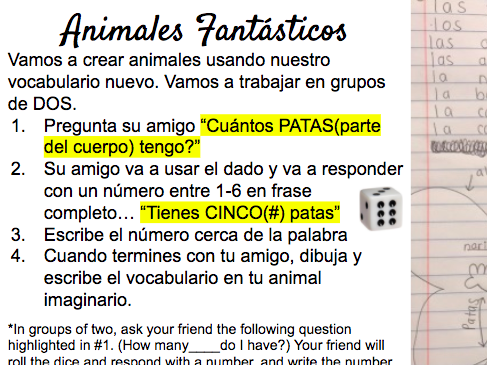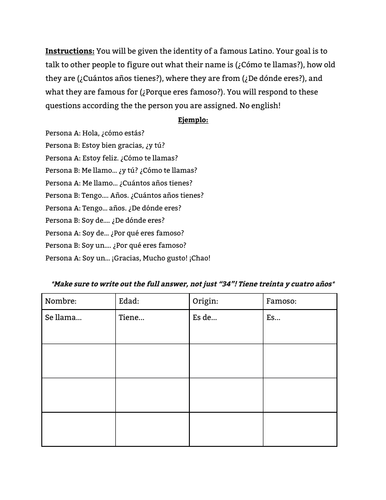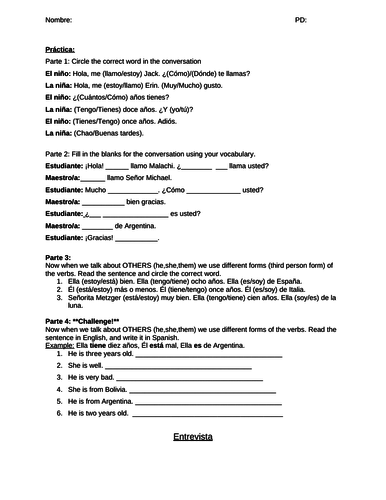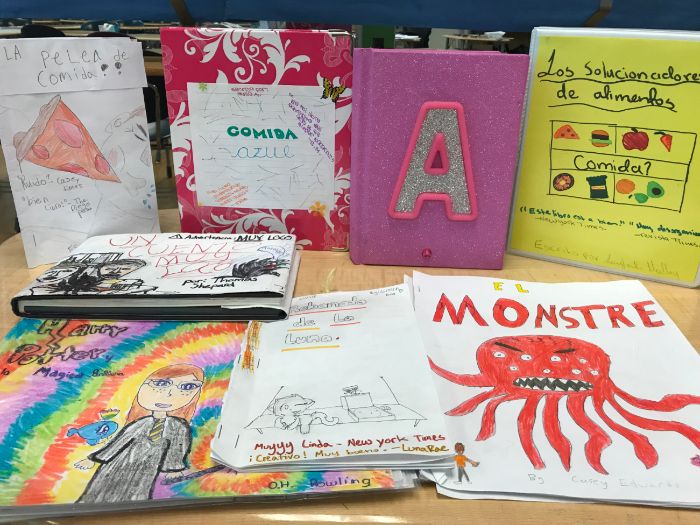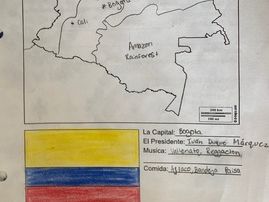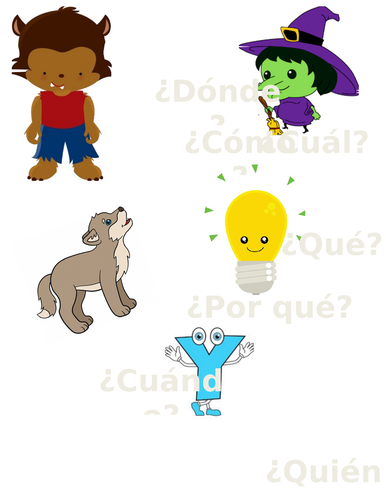38Uploads
6k+Views
400Downloads
World languages

Do Now: Realidades 3B Vocab
This is a DO NOW or warm up activity for Spanish class every day based on the food unit 3B from Realidades. I created memes to go with each day, and it increases in difficulty to complete each day, building up their vocabulary and written Spanish skills. Easy to modify if using a similar food unit, or a particular tense! I converted to microsoft word so you can edit it, so you might need to add one space to make it spilt exactly on two pages if you're not using pages - otherwise I've left it a pretty open template so that you don't need to change anything (kids fill in the date etc!)

Helping Puerto Rico TPRS with Notes
This slideshow describes what happened in Puerto Rico with easy to understand vocabulary (with a vocab sheet for students to follow along) and accompanying images. A TPRS activity, to learn about a real and current event. Students will learn about how they can help, and learn the vocab associated with helping in the community (aligns with Realidades and this Quizlet set https://quizlet.com/234082550/helping-the-community-spanish-vocabulary-flash-cards/).

Me Gusta and Communicative Activity Spanish
Me Gusta and Vocab (Infinitives) Notes and guided practice. Includes an interview section where students ask each other what they like, and graph out the classes responses.

Pets and Animals Spanish Vocabulary - Powerpoint, Readings, and Activities
This resource includes the following with very minimal prep needed for about a week of lessons!
-Vocabulary introduction for Spanish animals/pets
-Vocabulary introduction for parts of the body/animal body parts
-Adapted article about pets in Spanish
-Activity where students create their own facebook profile for a pet (describing things they like, adjectives, birthday, etc)
-Interactive group and communicative activities creating animals
-Fun songs and listening activities
-Writing activities and prompts
One of my favorite parts of the unit on animals and pets to teach :)
Hope you enjoy!

Adjectives Spanish Lesson
This resource includes an engaging Powerpoint embedded with games, videos, and activities for students learning adjectives in Spanish. The guided notes provided are in English, and the students write in Spanish. There a breaks for games where the students guess what photo is missing, like I spy, that describes an adjective they just learned (que falta). Also there are fun drawing activities and there is practice writing sentences. There is also a catchy song included with the main question “¿Cómo eres?”
Included are…
-guided notes
-a quizlet study set
-Power point/google slides

Spanish Winter Olympics 2018 Meme Activity
Inspired by Kyle Carr’s funny memes from the olympics - fun worksheet where students see funny pictures of Olympic athletes and then write their own memes/captions with the sentence starter “Esta es mi cara cuando…”. No prep needed - can be a homework or fun class activity, which can be extended to students searching photos and writing their own captions.

Juegos Olímpicos Spanish Sport Vocab
No prep, student led, cultural reading, and new vocab activity for Spanish classes.
Students read about athletes competing in the 2018 winter olympics from Spain and Argentina, and using context clues find the vocabulary (relating to winter sports and sports in general) and answer questions about sports they play. Additionally asks students to think and analyze why there are less spanish speaking countries in the winter olympics. Sparks interest and discussion, and answer key included.

Winter Olympics Spanish Sports - PowerPoints, Worksheets, and Activities
I love the Olympics – so I made a mini unit about sports revolving around the winter Olympics 2018 focusing on athletes from Spanish speaking countries. This resource includes all of the following – No prep needed!
-Powerpoint for the week - including fun vocab games, and interactive activities
-Worksheets for the following
New Sports Vocab - Student Led
Students read about athletes competing in the 2018 winter olympics from Spain and Argentina, and using context clues find the vocabulary (relating to winter sports and sports in general) and answer questions about sports they play. Additionally asks students to think and analyze why there are less spanish speaking countries in the winter olympics. Sparks interest and discussion, and answer key included.
Fun Olympics Meme Homework
Fun worksheet where students see funny pictures of Olympic athletes and then write their own memes/captions with the sentence starter “Esta es mi cara cuando…”. No prep needed - can be a homework or fun class activity, which can be extended to students searching photos and writing their own captions.
Communicative Activity - ¿Qué deporte juegas? ¿Cuándo?
students are given a model, and walk around the room asking other what sport they play and when. Students then write down the response of their peer in third person and graph the results of the class.
-Links to review websites for the vocabulary (Quizizz) and the Google slides version of the powerpoint.
Highly recommend using the link in the resource for the Google Slides version over the Power Point file, also Google slides version will give you access to the other documents as well
(how long the Powerpoint will last you, depends on your bell schedule and how long class periods are. This lasted me four full days of school with 55 minute class periods.)

Famous Latinos Communicative Activity
Students are given the identity of a famous Latino. Their goal is to talk to other students to figure out what their name is (¿Cómo te llamas?), how old they are (¿Cuántos años tienes?), where they are from (¿De dónde eres?), and what they are famous for (¿Porque eres famoso?). Students then respond to these questions according the the famous latino they are assigned, and copy down the responses of their peers. Can be easily extended where students go home and write down more information about the person they were assigned, create an instagram page for the person they received, etc. Heavy focus on communication on basic spanish questions, and writing in the third person - mixed with culture.

Dominican Republic Culture and Language Spanish
This is a full 60 minute lesson class about the Dominican Republic - targeted towards any level Spanish in middle/high school.
This lesson includes a no prep powerpoint, guided notes, and a fun communicative activity.
Powerpoint/Google Slides + Guided Notes: Gives students basic information about the Dominican republic (music, food, capital, sports) - and then gives students four rules about how Dominicans typically speak (drop the s, don’t pronounce the d between vowels, shortening words, etc). Students then listen to famous singers/rappers (Cardi B and El Mayor Clasico) and focus on the accent and pronunciation.
Communicative Activity: Students then take on the role of Romeo Santos or El Mayor Clasico - and read a conversation out loud with their partner. They use their best Dominican accents and fill in the blanks of what their friend said (speaking puzzle/fill in the blank activity). After they answer comprehension questions in English.
Creative Activity: As an exit ticket, students create a comic using the slang they learned in class to represent what they’ve learned in a fun new way!
I recommend using the google slides (included in the powerpoint) and the notes are included as well!

Spanish Introduction, Communicative Activity and Guided Practice
In this resource, students will practice basic introduction vocabulary (asking where others are from, how old they are, what they like to do, their name, and how they are doing). They first go through a scaffolded guided practice, then have an interview activity where they go around and ask other students these questions, and write their responses in the third person.

Argentina - Culture, Language, Accent (Spanish)
his is a full 60 minute lesson class about Argentina - targeted towards any level Spanish in middle/high school.
This lesson includes a no prep powerpoint, guided notes, and a fun communicative activity where students are the Pope and Messi.
Powerpoint/Google Slides + Guided Notes: Gives students basic information about the Argentina (Mothers of May, tango, food, sports) - and then gives students rules about how Argentinas typically speak (voseo, y–> SH, ll–>sh). Students then listen to people with Argentina accents in videos, and focus on the accent and pronunciation.
Communicative Activity: Students then take on the role of the Pope and Messi- and read a conversation out loud with their partner. They use their best Argentine accents and fill in the blanks of what their friend said (speaking puzzle/fill in the blank activity). After they answer comprehension questions in English.
Creative Activity: As an exit ticket, students create a comic or fun drawings, using the slang they learned in class to represent what they’ve learned in a fun new way!
I recommend using the google slides (included in the powerpoint) and the notes are included as well!

Spain - Culture, Language, and Accent Lesson (Spanish)
This is a full 60 minute lesson class about Spain - targeted towards any level Spanish in middle/high school.
This lesson includes a no prep powerpoint, guided notes, and a fun communicative activity.
Powerpoint/Google Slides + Guided Notes: Gives students basic information about the Spain (music, food, major cities, sports) - and then gives students four rules about how Spaniards typically speak (z–> th, G & J). Students then listen to famous singers and soccer players (Andrés Iniesta and Enrique Iglesias) and focus on the accent and pronunciation.
Communicative Activity: Students then take on the role of Andrés Iniesta and Enrique Iglesias- and read a conversation out loud with their partner. They use their best Spaniard accents and fill in the blanks of what their friend said (speaking puzzle/fill in the blank activity). After they answer comprehension questions in English.
Creative Activity: As an exit ticket, students create a comic or fun drawings like Mr.Wonderful, using the slang they learned in class to represent what they’ve learned in a fun new way!
I recommend using the google slides (included in the powerpoint) and the notes are included as well!

Adjectives Listening and Writing Activites
Fun listening, writing, and reading activity about adjectives. 4 audios are included where students check off the adjectives they hear (listen in spanish, check off in english). Then students draw the speakers based off of written descriptions, and then create their own description of an imaginary person and share with a partner. They then draw what they hear.
Answer Key Included
Adjectives focused on: trabajador, perezoso, fuerte, paciente, ordenada, simpático, amable, extrovertido, bajo, alto, guapo, gordo, delgado
Physical descriptions: tiene ojos verdes/castaños/azules //moreno, rubio, castaño// pelo largo, corto, liso, rizado// tiene… barba, pecas, trenzas, gafas//

Spanish Book Project
Want a way to engage your students in a student led project, that gives them a real final product that they can present in your school libraries and keep for years to come? This project gives students an outline of how to create their own Spanish book and become authors. This is perfect for reviewing main topics of Spanish 1-2 levels. The book outline has students review the following main concepts and information
-basic introductions/descriptive adjectives
-family vocabulary
-food vocabulary
-present tense and simple future tense (ir+a+infinitve)
-school vocabulary
-GUSTAR
This includes:
-A Google Slides presentation that goes through a few pages, models them, and gives students key words to help them write each page.
-Warm ups for every day where students can edit other’s book pages, and use it to help write their own
-A packet that guides students in writing 10 pages of a book
-A peer edit packet that helps students revise other students work

Colombia Culture Unit
Help your students learn about Colombia in an authentic way with this no prep lesson/presentation/activity set!
What’s included
Powerpoint and guided notes on music, food, politics, culture, geography, slang words, and more!
3 edpuzzle videos, where students watch videos about Cali, Medellin, and Santa Marta and respond to questions. Edpuzzle automatically grades for you!
Cloze lyric activity where students fill in the blanks to a famous Colombian singer (J Balvin)
A video that helps students learn the steps to dance Salsa Calena :)
Answer keys to the notes and cloze activity

Spanish Question Word Poster/Handout
This Poster has fun images to help students remember what key question words mean, you can enlarge this at a staples/etc or give it to the students as a handout.
Por qué - the letter Y/ Why?
Dónde - a werewolf/ Where?
Cuándo - a venn diagram/ When? (venn/when)
Cómo - howling wolf/ How?
Quién - an owl/ Who?
Cuál - a witch/ Which?
Qué - a light bulb/ What? (watt*)

Maya, Inca, and Aztec Projects (Presentation and Writing, Spanish)
This includes two projects, with instructions and rubrics in Spanish, to summarize what your students have learned about the Mayas, Incas, and Aztecas.
The writing summative (or final) assessment asks students to write about all three civilizations. Students are told they are time traveling and need to explain the three civilizations to the modern world, compare and contrast them, and explain who is their favorite civilization they visited. Included in this assessment is a rubric in Spanish.
The extension project is a summative (or final) presentation. In groups, students will represent someone famous from one of the three civilizations and will present their famous accomplishments to the class in the form of a modern-day interview/talk show. Students are instructed to create a presentation to show images of their accomplishments as they speak about them and to create a note guide for students to take notes about their accomplishments.
All rubrics/instructions are in Spanish.
Formative Quizzes (build-up to the summative writing): Available in my store

